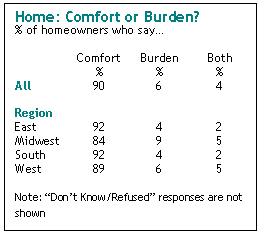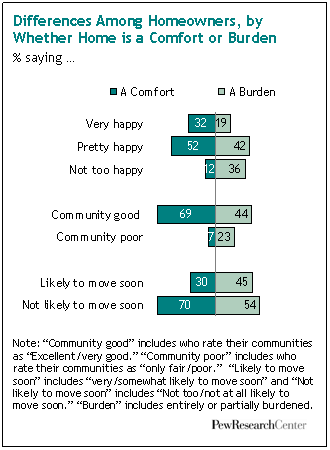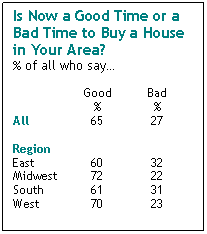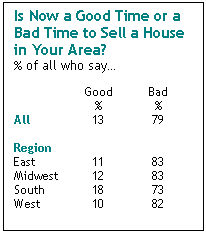Not even a housing-led recession can shake Americans’ faith in the blessings of homeownership.

House prices may be falling, foreclosures rising and residential sales weak — yet the vast majority of homeowners say their home is a source of comfort (90%) in their life, while just 6% say it is a burden, according to a Pew Research Center Social & Demographic Trends survey conducted Oct. 3-19, 2008 among a nationally representative sample of 2,260 adults, including 1,625 homeowners. Another 4% say their home is both a comfort and a burden.
This warm feeling of owners for their homes contrasts sharply with the nation’s chilly residential real estate market. By the end of last year, Zillow.com, an online real estate information source, calculated that U.S. home values had fallen 17.5% since the market peak in 2006- or by a total of $6.1 trillion.
Homeowners aren’t unmindful of this tanking market. Eight-in-ten (82%) in the Pew Research Center survey say that now is a bad time to sell a home in their area. More than seven-in-ten (73%) say that this is a good time to buy a home.
Despite the current national housing funk — or maybe as a refuge from it — owners in all the major demographic groups overwhelmingly say they view their home as a comfort. There are no differences by gender, race, age, income or education. Nor do people’s responses vary depending on whether or not they are married, have children or are employed. Owners who have never left their hometowns and those who have moved repeatedly are just as likely to say their homes are a comfort.
Responses vary somewhat, however, by region of residence. Midwestern homeowners (14%) are slightly more likely than those in the East or South (6% each) to say their home is at least partly a burden. Among Western homeowners, 11% say so.

There are larger differences on personal attitudes between comforted owners and those who view their homes as partially or entirely a burden. Burdened owners are less happy with themselves and their communities.
More than a third of burdened homeowners (36%) say they are not too happy, compared with 12% of comforted ones. (Overall, homeowners are happier than those who don’t own a home, but that difference appears to be largely explained by the fact that homeowners are more likely than renters to be married and to have high incomes — and both of these characteristics correlate with increased happiness.)
Only 44% of burdened homeowners rate their community as good to excellent, compared with 69% of comforted homeowners. Asked to rate particular aspects of their communities, most burdened owners give fair or poor marks to the local cost of living and to cultural activities, whereas most comforted owners rate those as good to excellent.
Burdened owners also are more likely to be planning to sell soon. Nearly half (45%) say they are likely to move in the next five years, compared with 30% of comforted owners. However, they also think they will have a harder time doing so. Nine-in-ten owners who view their home as entirely or partially a burden (92%) say it is a bad time to sell a house in their area, compared with eight-in-ten owners (81%) who view their home as a comfort.

Americans across all major demographic groups agree that is a bad time to sell a home but a good time to buy one. Nearly eight-in-ten (79%) of all respondents (renters and owners) say it is a bad time to sell a home in their area. Two-thirds (65%) say it is a good time to buy a home.
There are only a few sub-groups where the share believing it’s a seller’s market approaches one in five. They include Americans ages 18-29 (18%), black Americans (18%), and people with household incomes of less than $30,000 a year (20%)-all groups with below-average homeownership rates.

Suburban residents (83%) are somewhat more likely than those who live in cities (77%) or small towns (78%) to say it’s a bad time to sell. Among rural residents, 79% say it’s a bad market for sellers. People who moved to their current homes a decade or more ago (82%) are somewhat more likely than more recent arrivals (75%) to say it is a bad time to sell a home.
Among the regions, residents of the South (18%) are more likely to say it’s a good time to sell than residents of the East (11%), Midwest (12%) or West (10%). But residents of the South (61%) and East (60%) are less likely to say it’s a good time to buy than people who live in the Midwest (72%) and West (70%).
Almost everyone agrees that it’s a good time to buy a house: Men (70%) somewhat more than women (61%), and whites (69%) somewhat more than blacks (51%) or Hispanics (58%). Americans with higher levels of income and education are more likely to say it’s a buyer’s market in their area.




